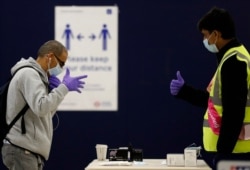The British government is facing strong criticism for its response to the coronavirus pandemic, as the latest forecasts suggest the economy could be the worst-hit globally. Britain has the world’s second-highest death toll from the virus and is emerging from its lockdown later than most of Europe.
The Organization for Economic Cooperation and Development, or OECD, this week forecast that Britain’s economy would shrink by 11.5% in 2020, the worst among developed economies. The predicted contraction was slightly worse than those of France (11.4%), Italy (11.3%) and Spain (11.1%). The U.S. economy is predicted to contract by 7.3% this year. Economists say Britain’s service-based economy made it especially vulnerable as this is one of the sectors hit hardest by the lockdown and global downturn.
The OECD warns any second wave of coronavirus infection would have an even bigger impact, with a possible 14% hit to Britain’s economy.
Many scientists say Britain did not act quickly enough when it was clear that the pandemic was spreading across Europe in early March. Italy, Spain and France enforced tough lockdowns at the time, enforced by police checkpoints and large penalties for anyone caught flouting new laws.
Britain eventually imposed a lockdown on March 23, mainly on the advice of scientists from Imperial College London. They predicted hundreds of thousands of deaths if the virus remained unchecked. Among scientists making that recommendation was professor Neil Ferguson, who offered a stark appraisal of the government’s actions when he appeared before a committee of lawmakers Wednesday.
"Had we introduced lockdown measures a week earlier, we would have reduced the final death toll by at least a half,” he told members of Parliament by video link.
Ferguson stood down from the government’s Scientific Advisory Group for Emergencies (SAGE) in May after he was caught breaking the lockdown rules.
Many other scientists say Britain did too little, too late. “We had a very relaxed [lockdown], ‘keep people socially distanced, try to stay at home’ — it was more of a nudge approach as opposed to ‘that’s the rules,’ ” molecular biologist Sterghios Moschos told VOA in a Skype interview earlier this month.
Britain has recorded more than 41,000 deaths from COVID-19, the second-highest death toll in the world after the United States. COVID-19 is the disease triggered by the coronavirus. Speaking Wednesday, Prime Minister Boris Johnson defended the government’s response.
“We made the decisions at the time on the guidance of SAGE, including professor Ferguson, that we thought were right for this country,” Johnson said at his weekly press conference.
Britain is still recording hundreds of deaths and thousands of new infections every day, many more than its European neighbors. The government argues the disparity is partly due to differences in testing and reporting.
Britain’s lockdown is slowly easing. Zoos, theme parks and small shops will be able to reopen June 15. Pubs and restaurants remain closed. In France, Italy and Spain, cafes have reopened, along with most schools. In Britain, most students will not return to school until September at the earliest.
That sparked strong criticism from Anne Longfield, the Children's Commissioner for England, a government-appointed official who works to promote the interests of children in policy decisions.
She said the extended school closure will have a lasting impact.
“We are in quite a ridiculous situation where over coming weeks children could be able to go to theme parks, they could be able to sit in pub gardens. They could avail to go shopping at Primark, but they can't go to school. And I think we are in danger of leaving children behind in this lockdown lifting and possibly furloughing childhood,” Longfield told Sky News this week.
Britain has introduced a compulsory 14-day quarantine for all arrivals in the country. Home Secretary Priti Patel told lawmakers the measure was necessary as the infection rate came down.
“Imported cases of the virus pose a more significant threat to our national effort and our recovery,” she told lawmakers June 3.
The travel industry has warned that the new quarantine rules will have a devastating impact. Several airlines including easyJet, Ryanair and British Airways have launched a legal challenge of the new rules.









